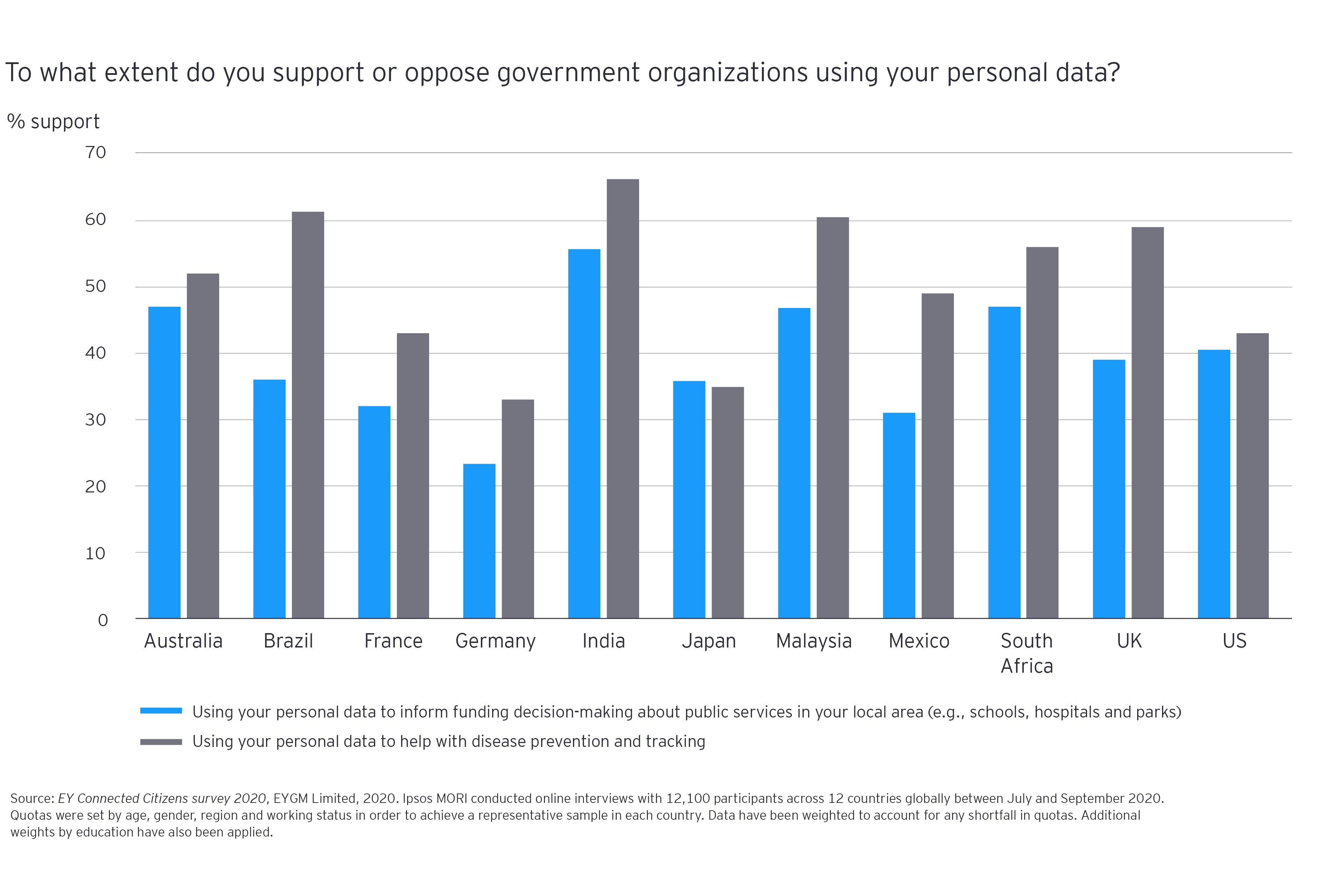Chapter 1
Embed innovative and agile practices
Building a more agile public sector workforce.
Governments have demonstrated extraordinary levels of innovation and agility compared to normal times, solving problems swiftly, taking risks, and repurposing teams and assets at speed to address fast-moving challenges. This welcome development could be fostered by identifying and replicating the processes that underpinned the new decision-making and resource-allocation processes. Governments can also secure the new agility of public sector workforces by formalizing agile working practices, for example, through flexible or remote working and the rapid adjustments of roles to meet changing needs.
Since very few governments were working in this way prior to the crisis, many technological, cultural and process changes were required in a very short period of time, and these may need to be evaluated and formalized. The Indian Government, for example, has developed a draft framework for working from home and a new set of standard operating procedures to ensure the continued smooth and seamless functioning of the Government.1
Chapter 2
Promote the importance of science and data
Using science and data comprehensively, but responsibly.
Scientific expertise and good data have been huge assets in this crisis, and evidence-based policymaking has made a welcome return to the center stage. The pandemic has led to the largest exchange of scientific data in history. The COVID-19 Technology Access Pool (C-TAP), for example, is harnessing the collective efforts of the global scientific community by creating a one-stop shop for data, knowledge and intellectual property relating to diagnostics, medicines, vaccines and any other tools that may work against COVID-19. Many countries, states and local government agencies are also using data and analytics to identify those individuals and entities who need the most assistance and target their support effectively.
Meanwhile, open data and hackathons have allowed people to come together to find innovative solutions to the economic, social and technological challenges of the pandemic. In April 2020, the Global Hack brought together more than 12,000 participants from over 100 countries to work on 500 innovative projects to combat the crisis. And the EUvsVirus hackathon, orchestrated by the European Commission in April 2020, allowed thousands of citizens, businesses and administrators to collaborate and identify more than 100 solutions to support the European and global recovery.
However, there has also been criticism of the use of data and analytics to address COVID-19- related problems. In some cases, governments have taken actions based on unreliable or questionable methods – while some have not acted on scientific advice.
The urgency to address public health concerns during COVID-19 has risked undermining people’s privacy, as governments made trade-offs between personal liberties and biosecurity. The need for greater testing and monitoring of the population for signs of COVID-19 transmission was used to justify greater surveillance powers for governments. But there is potential for misuse if these powers become permanent, and for the deployment of mass surveillance tools to become normalized in countries that have so far rejected them. Research data suggests governments have some way to go to build citizens’ trust in the use of their data for government decision-making; though people are more comfortable with the use of their data for disease prevention and tracking.

In future, the public will want to see governments demonstrate, and even insist on, strong scientific and evidential support for policies, not only within the medical sphere, but also with other pressing problems, such as long-term unemployment and the climate crisis. But it is also vital that governments guard against the misuse of data by strengthening regulations around use of people’s personal data. This can be achieved by giving citizens more control over how their data is used and by developing rules to manage ethical concerns over the use of new tools such as AI.
Greater transparency and the willing cooperation of a well-informed public will be vital to build trust and help people make more informed personal choices. Encryption and other leading cybersecurity practices for data security and privacy will be crucial to prevent data misuse.
Related article
Chapter 3
Retain new external partnerships
Toward a revived spirit of co-operation.
The response to COVID-19 has required deep collaboration with organizations outside of government, for example, PPE and respirator manufacturers. In Canada, for instance, industry and government stakeholders convened to reimagine how sparse domestic manufacturing capacity could be repurposed to confront the PPE shortage, invest substantially in this effort, and work decisively to remake a specialized and global supply chain virtually overnight. Governments are also forging partnerships with unions to design economic support for workers as well as COVID-19-safe working practices; and with universities for the development of vaccines and treatments. While such partnerships are not new, the depth and speed of collaboration is without recent precedent.
Meeting the challenges of the post COVID-19 world will be made easier if governments — and their partners — continue this collaboration for the long term, working together to address mutual challenges. Governments can harness the knowledge and resources of the wider ecosystem – including startups, small and mid-size enterprises (SMEs), entrepreneurs, universities and research institutions, and civil society organizations – to address policy challenges. Reforms to traditional procurement practices and policies will open up opportunities for smaller and nontraditional partners. For example, the South Australian Government’s new Go2Gov program was created to enable start-ups and early stage businesses to pitch novel and innovative solutions.
The crisis has also underlined the importance of collective leadership in tackling global challenges. The World Health Organization (WHO) has played an important role in helping countries to prevent, detect and respond to the pandemic. The EU organized a pledging conference to provide funding to develop and deploy a vaccine against COVID-19. But many other multilateral institutions have come under criticism for failing to muster a coordinated response.
Related article
The crisis has underlined the importance of collective leadership in tackling global challenges.
There has been talk for some time about the need to reinforce and modernize the rules-based multilateral system — an “operating system upgrade” — as the World Economic Forum has called it. The crisis might provide the impetus to do this. National governments will have a critical role to play in revitalizing those multilateral institutions, rather than undermining them through isolationist policies. But non-state actors are also stepping up their efforts to enhance multilateral cooperation in times of crisis.
The Bill & Melinda Gates Foundation’s donation to the WHO to encourage international efforts to develop diagnostics, therapeutics and vaccines, and the joint initiative by the Ethiopian Government and the Chinese tycoon Jack Ma to provide medical supplies to African states, are just two examples of a new kind of international cooperation.
Chapter 4
Forge a new partnership with individuals
Responsive government and active citizens.
In many countries, there is a growing sense that the altruistic spirit shown by citizens during COVID-19 could be nurtured and continued after the crisis. In the US, more than 5,500 technology-specialist volunteers stepped up to join the nonprofit US Digital Reserve (USDR), which is supporting government agencies with the rapid switch to digital working. It has since been announced that USDR intends to continue its efforts and expand its remit.
This new community spirit has been accompanied by significant innovation in the type and extent of communication between governments and individuals. Many governments have used digital information portals, AI chatbots, mobile apps and social media platforms to connect with people and ensure that they are well informed about the virus, and can protect their own health and wellbeing. New digital e-participation tools have allowed governments to collect input from citizens on a large scale thereby increasing trust, while at the same time providing insights to enrich their own decision-making processes. This transparent sharing of data and evidence has also helped build trust within communities and ensured public acceptance of radical measures such as lockdowns. Recent actions to protect the public saw trust in government rise to an all-time high of 65% (an increase of 11 points between January and May 2020), according to the Edelman Trust Barometer.
We have also seen the use of whole-of-population text messages and regular “check-in” phone calls to the vulnerable. Some government agencies are recruiting citizen volunteers to capture real-time data through various devices to fill data gaps and help them make better predictions on issues such as energy use, public health and planning for extreme weather events. These new communications channels are likely to be valuable post COVID-19, as part of a new partnership between governments and individuals.
The next few years could see nations and cities testing different models for participatory engagement to identify, debate and decide on a wide range of topics. Cities, for example, are emerging as creative centers of digital democracy. Madrid with Decide Madrid, Seoul with Sharing City and Barcelona with its Fab City initiative are at the forefront of efforts to create platforms for public participation in decision-making and promote collaboration that leads to innovative solutions to urban problems.2
Summary
From mass remote working among public sector workers to the use of data and apps to gather vital information for decision-making, governments moved quickly and did things differently in their efforts to manage the COVID-19 crisis. These advances can be secured and extended if governments formalize flexible working, increase public trust in their use of data, broaden partnerships with private and third sector groups, and empower citizens to become more active in their communities.


